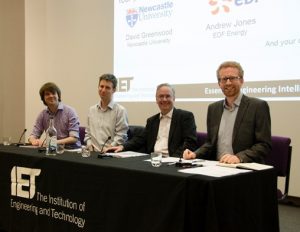CESI researcher, Dr. David Greenwood, recently participated in an IET debate event discussing the rollout of smart meters in the UK. In this week’s blog, he talks us through the highlights of that debate.
About the Author

Dr David Greenwood is a researcher with the National Centre for Energy Systems Integration (CESI) and is based at Newcastle University. His research focuses on taking advantage of flexibility within energy systems and understanding sources of uncertainty and variability such as customer demand and intermittent generation. He believes that Smart Metering can play a crucial role in both of these areas, but that the approach currently being followed the UK will deliver neither the flexibility nor the understanding that we need to ensure a reliable, sustainable, and affordable energy supply.
Contact Details:- david.greenwood@ncl.ac.uk Profile Details
I recently traveled to Guildford represent the National Centre for Energy Systems Integration (CESI) in a panel discussion around Smart Meters, arranged by IET Surrey. The event took place at the University of Surrey, and attendance was over 150.
Along with my fellow panelists – Craig Lucas from the UK Government’s Department for Business, Energy and Industrial Strategy, and Andrew Jones from EDF Energy – I answered a variety of questions from the audience around the technical, commercial, and social aspects of Smart Metering. The audience was often combative, particularly when discussing issues around the GB Smart Meter roll-out, which has received substantial negative media coverage. There were concerns around the cost of the rollout, whether the supply companies were going to complete it within the mandated timeframe, and data privacy, along with significant doubts around what the benefit would be to an individual customer, and to society at large.
While the other panellists focussed on the technical aspects of the rollout, I used my answers to describe the place of smart metering in an integrated energy system, on the need for more customer flexibility in a future energy system, and on the trade-off between data privacy and a more reliable, affordable, and sustainable energy system. I tried to get the audience on side by drawing an analogy between Smart Metering and the Google Maps traffic system; this system uses personal speed and location data from smartphone users to identify areas of heavy traffic, and in doing so provides a benefit to all of its users. Smart Meters have the potential to deliver similar benefits to electricity and gas customers by identifying when and where energy is being used and allowing network and system operators to make better-informed decisions as a result.
The event was thought-provoking for me, the audience was certainly engaged with the topic, and it was enlightening to be speaking alongside the other panelists who brought different perspectives and expertise from my own. Whilst I know we didn’t persuade everyone in the audience, I still think Smart Metering can and will deliver substantial benefits to our energy system, but many other enablers – including innovative tariffs and charging structures, better user education, and more smart home devices – are necessary for the rollout to fulfill its potential. Traditional metering will soon – as I told one audience member who was determined not to be upgraded – belong in a museum.

The IET panel